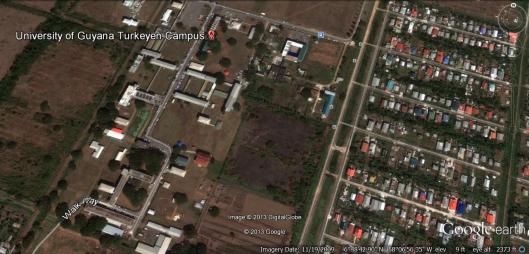Tags
Dr. Cheddi Jagan, Global economic crisis, Global unemployment, Higher education, University of Guyana
 University of Guyana – Turkeyen Campus – Guyana
University of Guyana – Turkeyen Campus – Guyana
Source: Google Earth
Fifty years serving Guyana since its inception on 19 April 1963. A remarkable achievement for a young developing nation with a population of less than 800,000.
The University of Guyana is the legacy of a leader whose mother never went to school and father who left school before he was ten. Ignoring the naysayers, Dr. Cheddi Jagan, an American trained dentist, had pursued his vision for Guyana’s future as an independent nation. Together with other founding members, he initiated evening classes in the country’s top secondary school building and rented buildings around Georgetown.
Dr. Jagan knew that realizing a big dream started with small steps.
From a small beginning of 179 undergraduates, the university has grown to over 5,000 students at its Turkeyen Campus opened in October 1969.
Small beginnings did not mean low educational standards. Socialist scholars in the United Kingdom and the United States assisted in staff recruitment. Academics from renowned universities designed and assessed the curriculum.
The founders of the University of Guyana saw the crucial need for preparing Guyanese to take their roles in developing the nation after its independence from Britain. Very few citizens could afford pursuing higher education overseas. A nation needs qualified teachers, nurses, doctors, agricultural and industrial technicians, high-level public service professionals, scientists, and much more.
They also envisaged the university’s role in on-going research and as a means to creating a group of intellectuals capable of defining the goals of a young nation and finding solutions to persistent socioeconomic deficiencies.
Over the past fifty years, the University of Guyana has indeed played a vital role in the nation’s development.
As a member of the alumni, I can say that my years of study at the university have made an invaluable difference in my professional life and, as a geographer, the way in which I perceive the world and my role in contributing towards a better society for all.
Today, we live in different times. We have different needs. We face different challenges. Since 2008, the world struggles to recover from a global economic crisis. According to a news report from the International Labor Organization, global unemployment rose again in 2012. There are not enough jobs available for all the graduates leaving our universities. Private companies continue to cut labor costs to remain competitive. Governments have to tighten their budgets and reduce the number of civil service jobs.
University graduates cannot apply their knowledge in the service of their communities where job opportunities do not exist. Are they prepared to take control of their own careers? When they fail to obtain job placements, are they equipped to work freelance, start their own sole-proprietor or small businesses?
If high unemployment rates persist worldwide, will our young people still see a university education as a means to achieving their goals in life? Will the University of Guyana still remain relevant in its mission in serving the nation? Will it survive for another fifty years?

Reblogged this on Guyanese Online.
LikeLike
Cyril, a big thank you for sharing my blog post. A happy Sunday!
LikeLike
“Live as if you were to die tomorrow. Learn as if you were to live forever.”
― Mahatma Gandhi
Happy Fiftieth Anniversary UG! Thanks for sharing Rosaliene
LikeLike
Dmitri, thanks for that quote from Mahatma Gandhi.
LikeLike
Rosaliene, great article and historical info for people like me who left seven months later and did not realize that the University of Guyana was in the making. mucho grascias!
LikeLike
Thanks for reading and commenting, Yvonne.
I, too, have missed out on many great developmental projects in Guyana since my departure. Even so, as Guyanese in the Diaspora, we can still share in these achievements.
LikeLike
The graduates of the University of Guyana, unfortunately, have joined their peers all over this world in these times with few job opportunities and rising costs – and seemingly oblivious governments. It cannot continue this way. I congratulate Guyana and its accomplishments but I fear for the future – yet, we must persevere.
LikeLike
Angela, thanks for reading and sharing your thoughts.
The only thing certain about our future is the uncertainty. As you so rightly said, “we must persevere.”
LikeLike
Found this old post that made me happy 🙂 Education is a light.
LikeLiked by 1 person
Inese, education has, indeed, been a light in my life. To this day, I continue to learn more and to seek understanding of those things that lie outside of my personal experiences.
Thanks for reading. It’s quite an old post. Glad that it’s still relevant.
LikeLiked by 1 person
It is relevant indeed.
LikeLike